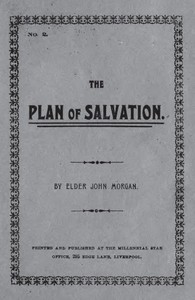| Summary |
"The Plan of Salvation" by John Morgan is a doctrinal publication written during the early 20th century. This book presents the beliefs of the Latter-day Saints regarding fundamental questions about human existence, such as where we come from, why we are here, and where we go after life on earth. It engages with themes of pre-existence, faith, repentance, and the nature of salvation, emphasizing the need for baptism and the receipt of the Holy Ghost in the context of Latter-day Saint theology. In this work, Morgan systematically outlines the Latter-day Saints’ perspective on the divine plan as revealed in Scripture. He explores the concepts of pre-existence, of humanity living in the presence of God before birth, and the purpose of earthly life as a probationary period wherein individuals can gain knowledge and experience. Morgan elaborates on the essential principles of faith, repentance, baptism for the remission of sins, and the importance of the laying on of hands to receive the Holy Ghost, suggesting these are critical for achieving salvation. The text also addresses the controversial topic of baptism for the dead, positing that this practice allows deceased individuals to have the opportunity to accept the gospel. Throughout, Morgan argues for the completeness and justice of God's plan, aiming to provide assurance and clarity amidst diverse theological opinions. (This is an automatically generated summary.)
|

